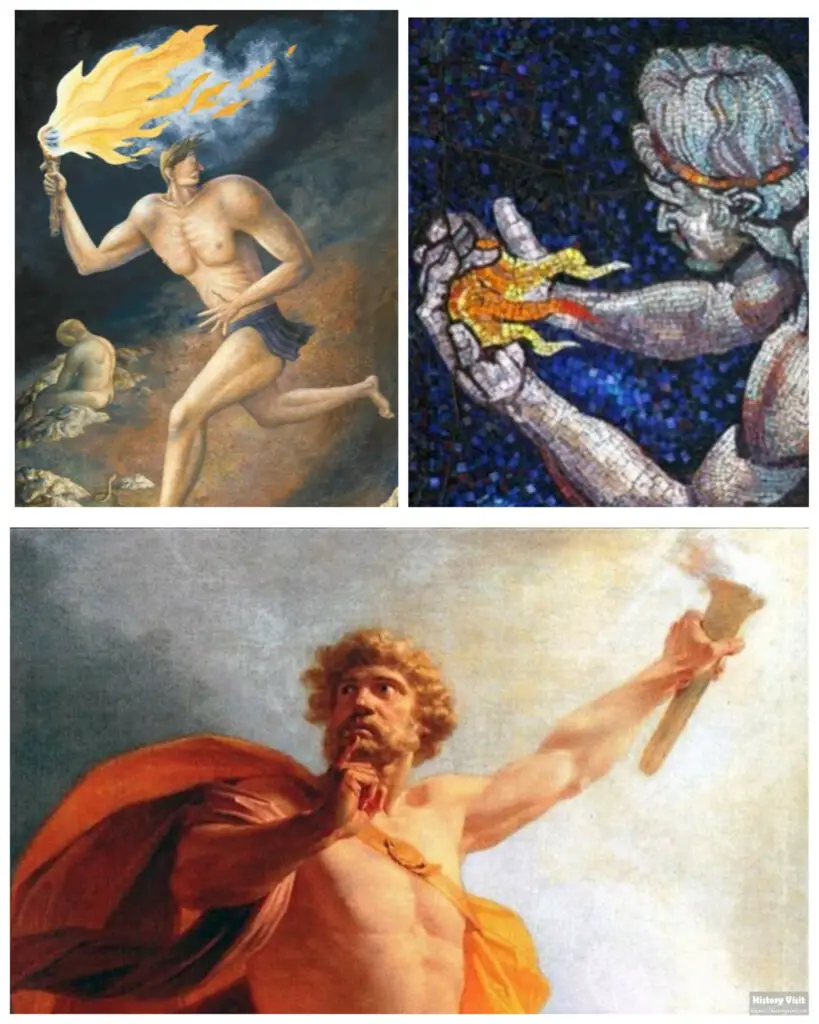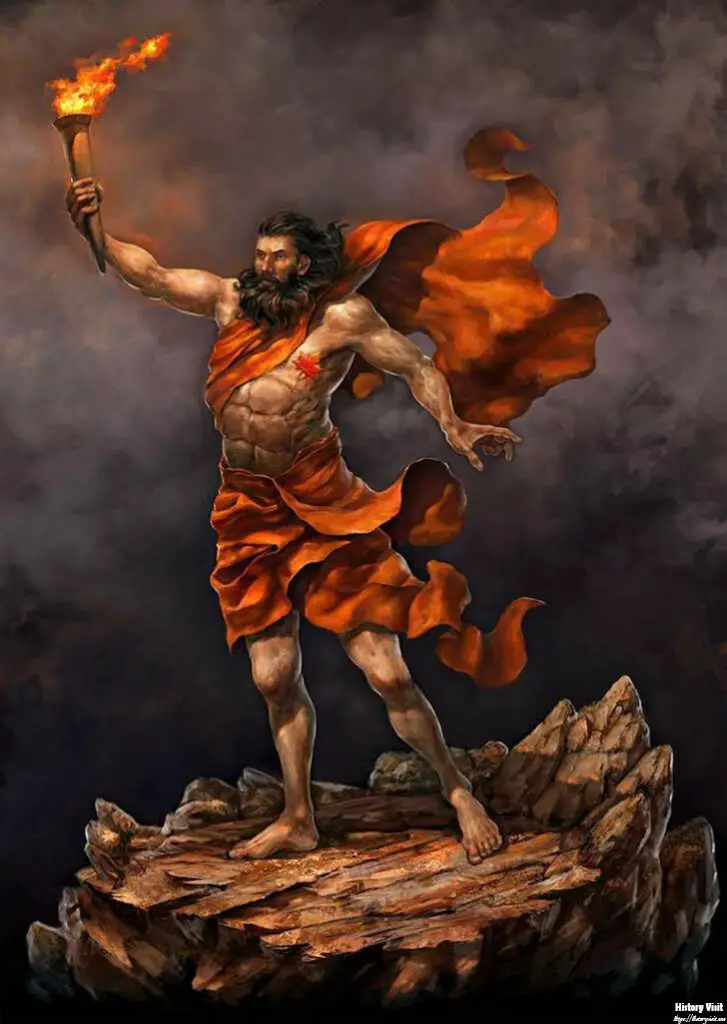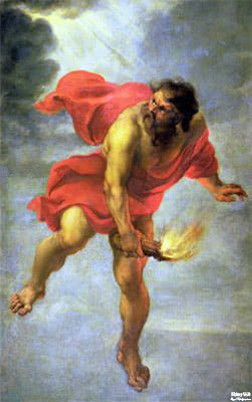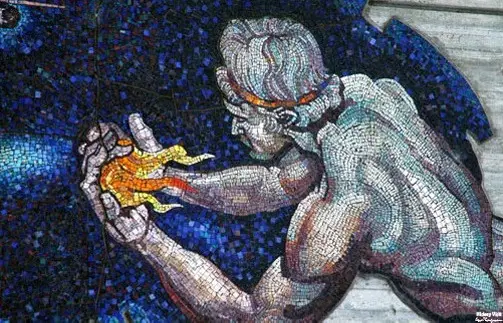Greek Mythology: Prometheus and His Fiery Gift

Introduction
Greek mythology is rich with tales of gods and heroes. One of the most compelling stories is that of Prometheus. He is a Titan, is known for his intelligence and cunning. His most famous act was stealing fire for humanity.
This act of defiance had profound consequences. It shaped the relationship between gods and humans. The story of Prometheus and the gift of fire highlights themes of rebellion, punishment, and innovation. Greek mythology uses these themes to explain human nature and divine will.

Prometheus’ tale is central to Greek mythology. It shows the complexity of divine-human interactions. The myth is not just a story; it’s a reflection of ancient beliefs and values. Understanding this myth offers insight into Greek culture and thought.
The Greek Mythology Of Titan Who Defied Zeus

Prometheus was a Titan, the son of Iapetus and Clymene. Unlike other Titans, he sided with Zeus during the Titanomachy. This war between the Titans and Olympians reshaped Greek mythology. After the Olympians’ victory, Prometheus’ relationship with Zeus changed.
Prometheus was known for his wisdom and foresight. His name means “forethought.” He could see the future and often used this ability to benefit humanity. His compassion for humans set him apart from other gods in Greek mythology.
Zeus, the king of the gods, became increasingly tyrannical. He withheld fire from humans, keeping them in darkness and ignorance. Prometheus saw this as unjust. He decided to challenge Zeus, risking his own safety. This decision marked the beginning of his rebellion.
Prometheus’ defiance was a bold move. It showcased his bravery and dedication to humanity. His actions would have lasting repercussions in Greek mythology. This act of rebellion is central to his story and highlights his role as a benefactor of mankind.
The Theft of Fire

Prometheus’ theft of fire is one of the most iconic moments in Greek mythology. Fire symbolized knowledge, technology, and progress. By stealing it, Prometheus brought these gifts to humanity. This act transformed human civilization.
Prometheus tricked Zeus to steal fire. He hid it in a fennel stalk and brought it to Earth. Humans, who had been living in darkness, now had the means to cook food, create tools, and develop society. This gift elevated them from their primitive state.
Zeus’ reaction was swift and furious. He saw Prometheus’ act as a direct challenge to his authority. Fire was a divine element, and its theft was a severe offense. Zeus decided to punish Prometheus and humanity for this transgression.
The theft of fire symbolizes more than just the acquisition of a physical element. In Greek mythology, it represents the quest for knowledge and the human spirit of innovation. Prometheus’ act underscores the idea that progress often comes with great risk.
The Punishment of Prometheus

Zeus devised a terrible punishment for Prometheus. He had the Titan bound to a rock in the Caucasus Mountains. Every day, an eagle would come and eat Prometheus’ liver. Each night, his liver would regenerate, making the torment endless.
This punishment was brutal and symbolic. In Greek mythology, the liver was considered the seat of human emotions and desires. By having his liver eternally consumed, Prometheus’ suffering was both physical and emotional.
Prometheus’ punishment served as a warning to other gods and mortals. Defying Zeus’ will would result in severe consequences. This story highlights the balance of power in Greek mythology. It underscores the dangers of challenging divine authority.
Despite his suffering, Prometheus remained unbroken. He endured his punishment with dignity and resilience. His strength and perseverance are celebrated in Greek mythology. They symbolize the human capacity to withstand suffering and maintain hope.
The Impact on Humanity
Prometheus’ gift of fire had a profound impact on humanity. Fire enabled technological and cultural advancements. It allowed humans to cook food, which improved their diet and health. Tools and weapons made from fire-forged metals advanced society.
In Greek mythology, fire represents enlightenment and knowledge. Prometheus’ act brought these to humans, elevating them from primitive beings to a civilized society. This gift fostered creativity and innovation, hallmarks of human progress.
However, Zeus’ punishment extended to humanity as well. He created Pandora, the first woman, and sent her to Earth. Pandora brought with her a jar containing all the evils of the world. When she opened it, these evils were released, bringing suffering to humanity.
Pandora’s jar (often referred to as Pandora’s box) introduced pain, disease, and death. This added a duality to Prometheus’ gift. While fire brought progress, Pandora’s jar brought suffering. This balance of good and evil is a recurring theme in Greek mythology.
The Symbolism of Fire in Greek Mythology
Fire holds significant symbolic meaning in Greek mythology. It represents knowledge, transformation, and power. Prometheus’ gift of fire is more than a myth; it’s a metaphor for human enlightenment.
Fire’s transformative power is evident in its practical uses. It turns raw materials into useful tools and cooked food. Similarly, knowledge transforms society, leading to progress and innovation. Prometheus’ theft of fire symbolizes this transformative potential.
In Greek mythology, fire also represents divine power. By stealing it, Prometheus bridged the gap between gods and humans. This act challenged the divine order and redistributed power. It underscored the theme of rebellion and its consequences.
Prometheus’ story highlights the double-edged nature of fire. While it brings warmth and progress, it also brings destruction. This duality reflects the complexities of human existence and the pursuit of knowledge. It emphasizes the need for balance and wisdom in wielding power.
Legacy in Greek Mythology

Prometheus’ legacy in Greek mythology is enduring. He is remembered as a champion of humanity and a symbol of resistance. His story has been retold in various forms, from ancient texts to modern adaptations.
Prometheus’ defiance of Zeus is seen as a heroic act. He challenged the status quo and brought enlightenment to humanity. His suffering and resilience are celebrated as symbols of human endurance. This legacy has influenced countless works of literature and art.
In Greek mythology, Prometheus represents the spirit of inquiry and innovation. His story encourages questioning authority and seeking knowledge. It highlights the importance of progress and the sacrifices it often entails.
Prometheus’ tale is also a cautionary one. It warns of the consequences of hubris and defying the divine order. This duality makes his story complex and multifaceted. It continues to resonate with audiences, reflecting timeless themes of power, rebellion, and enlightenment.
Conclusion

The story of Prometheus and the gift of fire is a cornerstone of Greek mythology. It explores themes of rebellion, punishment, and progress. Prometheus’ defiance of Zeus and his gift to humanity highlight the complexities of divine-human interactions.
Prometheus’ punishment underscores the consequences of challenging authority. It serves as a reminder of the balance of power in Greek mythology. Despite his suffering, Prometheus’ resilience symbolizes the enduring human spirit.
The impact of Prometheus’ gift on humanity is profound. Fire represents knowledge, innovation, and progress. While it brought advancements, it also introduced new challenges. This duality is a recurring theme in Greek mythology.
His legacy continues to inspire. His story encourages the pursuit of knowledge and the questioning of authority. It remains relevant, reflecting timeless themes and human aspirations. The myth of Prometheus is a testament to the power of Greek mythology and its enduring influence on culture and thought.


